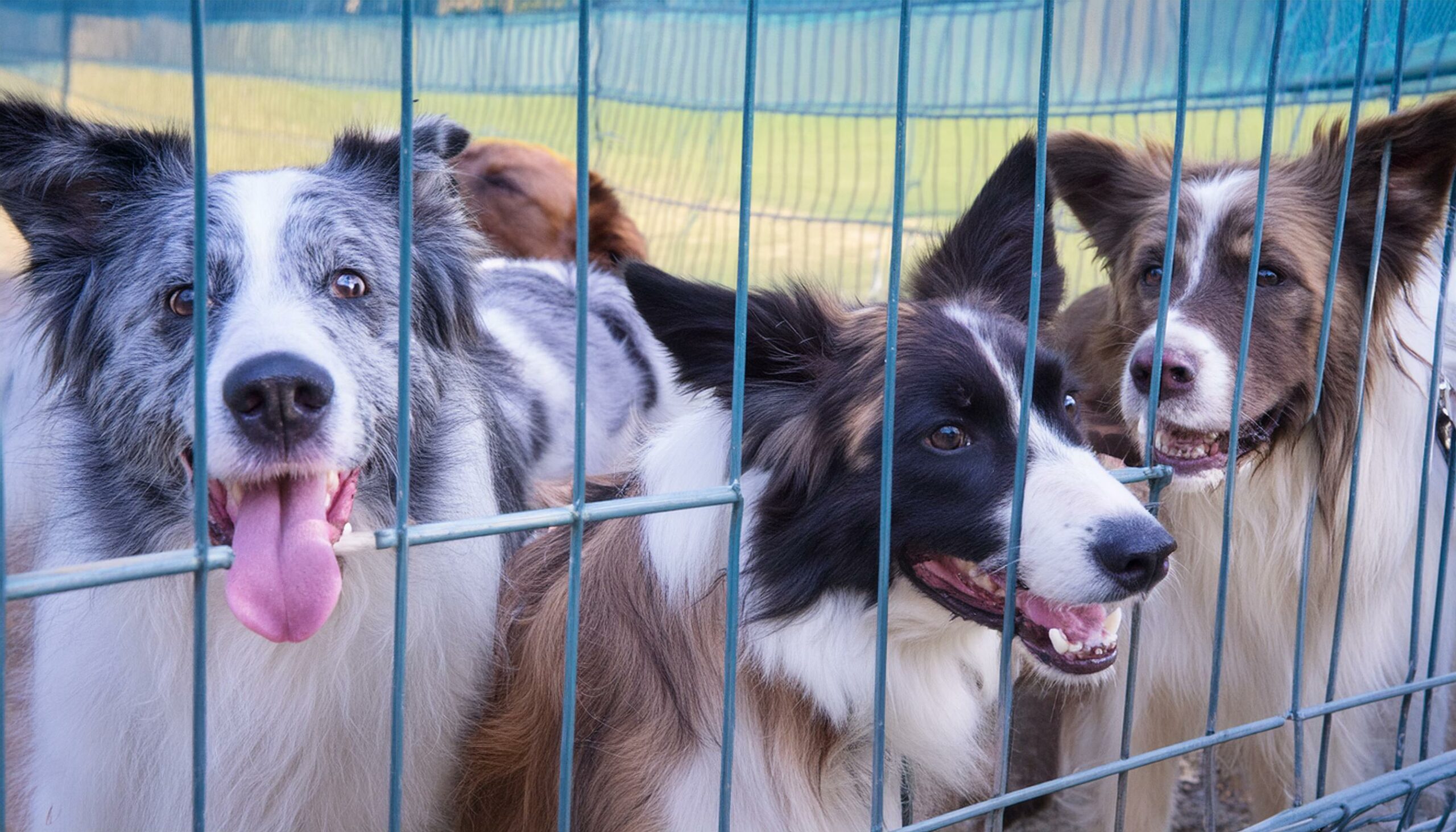Border Collies have long been celebrated for their exceptional intelligence, agility, and unwavering loyalty. They are a breed apart, known for their remarkable traits that make them one of the most popular dog breeds worldwide. However, despite their numerous positive attributes, questions often arise about their temperament, including whether they tend to be clingy. In this comprehensive guide, we’ll delve into the intricacies of Border Collie behavior to uncover the truth behind their perceived clinginess.
Understanding Border Collie Behavior
Origins and History of Border Collies
To understand Border Collies’ behavior, it’s essential to explore their origins and history. Originating in the border regions of England and Scotland, Border Collies were primarily bred for their herding prowess. Their exceptional intelligence, agility, and innate herding instincts made them invaluable for managing livestock in rugged terrains. Over time, their versatility and adaptability led to their widespread popularity not only as working dogs but also as beloved companions and competitors in various dog sports.
Behavioral Traits of Border Collies
Border Collies exhibit a distinctive set of behavioral traits that set them apart from other breeds. Their high energy levels, intelligence, and intense focus are hallmark characteristics. They thrive on mental stimulation and physical activity, requiring ample opportunities to engage their minds and bodies. Additionally, Border Collies are highly social animals, forming deep bonds with their families and displaying unwavering loyalty to their owners.
Clinginess in Border Collies

What is Clinginess in Dogs?
Clinginess in dogs refers to excessive dependence on their owners, often manifesting as a desire for constant attention and physical contact. While some degree of attachment is natural and healthy in canine companionship, excessive clinginess can lead to behavioral issues and distress for both the dog and the owner.
Signs of Clinginess in Border Collies
Border Collies prone to clinginess may exhibit various behaviors indicative of their need for closeness. These behaviors include following their owners everywhere, displaying anxiety when separated, and seeking constant physical contact. While these actions stem from a genuine desire for companionship, they can become problematic if not addressed appropriately.
Factors Influencing Clinginess in Border Collies
Several factors contribute to the clinginess observed in some Border Collies. Their inherently social nature predisposes them to seek interaction and companionship with their owners. Additionally, environmental factors such as changes in routine or prolonged periods of isolation can exacerbate clingy behaviors. Moreover, Border Collies are susceptible to separation anxiety, a condition characterized by distress and anxiety when left alone, further intensifying their need for closeness and reassurance.
Reasons for Clinginess
Social Nature of Border Collies
Border Collies are renowned for their social nature and strong desire for companionship. They form deep bonds with their families and thrive on interaction and engagement. Their inherent need for closeness with their owners can sometimes translate into clingy behaviors, as they seek reassurance and connection.
Separation Anxiety
Separation anxiety is a common issue among Border Collies and other breeds, characterized by distress and anxiety when left alone. Dogs with separation anxiety may exhibit clingy behaviors as a coping mechanism to alleviate their feelings of isolation and insecurity. Addressing separation anxiety requires patience, consistency, and sometimes professional intervention to help the dog cope with being alone.
Lack of Mental Stimulation
Border Collies are highly intelligent and require ample mental stimulation to prevent boredom and frustration. Without sufficient mental enrichment, they may resort to clingy behaviors as a means of seeking attention and engagement. Providing stimulating activities, such as training exercises, puzzle toys, and interactive games, can help alleviate boredom and reduce clinginess.
Managing Clinginess

Providing Adequate Exercise
Regular exercise is crucial for Border Collies to maintain their physical and mental well-being. Engaging in activities such as running, hiking, and interactive play sessions helps channel their energy in a positive manner and reduces clingy behaviors. Daily exercise also strengthens the bond between the dog and its owner, fostering a healthy relationship based on trust and mutual enjoyment.
Mental Stimulation and Training
Stimulating the Border Collie’s mind through training exercises and interactive games is essential for preventing boredom and reducing clinginess. Training sessions not only provide mental enrichment but also strengthen the bond between the dog and its owner. Positive reinforcement techniques, such as rewards and praise, are particularly effective in shaping desired behaviors and promoting a harmonious relationship.
Creating a Routine
Establishing a consistent daily routine provides structure and predictability for Border Collies, helping alleviate anxiety and uncertainty. A routine that includes regular feeding times, exercise sessions, and quiet periods for rest and relaxation helps the dog feel secure and confident in its environment. Consistency is key to reinforcing positive behaviors and reducing clinginess associated with changes in the daily routine.
Addressing Separation Anxiety
For Border Collies struggling with separation anxiety, gradual desensitization techniques and behavior modification strategies can help alleviate their distress. These may include gradually increasing the dog’s tolerance to being alone, providing comfort items such as blankets or toys, and using calming supplements or medications under veterinary guidance. Professional guidance from a certified dog trainer or behaviorist may be necessary to develop a tailored plan for managing separation anxiety effectively.
The Importance of Bonding
Building a strong bond with your Border Collie is essential for fostering a healthy and fulfilling relationship. Spending quality time together, engaging in activities that the dog enjoys, and providing consistent love and support strengthens the bond between the owner and the pet. A strong bond based on trust and mutual respect forms the foundation for addressing behavioral issues such as clinginess and promoting overall well-being.
Myths About Border Collies and Clinginess
Debunking Common Misconceptions
Contrary to popular belief, not all Border Collies are inherently clingy. While they possess a strong attachment to their owners, individual temperament and upbringing play significant roles in determining their behavior. With proper training, socialization, and environmental enrichment, clinginess can be mitigated, and Border Collies can thrive as well-adjusted companions.
In conclusion, Border Collies are not inherently clingy, but their social nature and susceptibility to separation anxiety can predispose them to clingy behaviors. By providing adequate exercise, mental stimulation, and a structured routine, owners can help mitigate clinginess and foster a balanced relationship with their canine companions.
FAQs (Frequently Asked Questions)
Do all Border Collies exhibit clingy behavior?
Not all Border Collies are inherently clingy. While they possess a strong bond with their owners, individual temperament and upbringing play significant roles in determining their behavior.
Can separation anxiety be cured in Border Collies?
While separation anxiety can be managed through behavior modification techniques and training, it may not be completely cured. Consistent management strategies and patience are essential for alleviating symptoms.
How much exercise do Border Collies need to prevent clinginess?
Border Collies require a minimum of one to two hours of vigorous exercise daily to maintain their physical and mental well-being. Adequate exercise helps channel their energy and prevents boredom-induced clingy behaviors.
Are Border Collies suitable for first-time dog owners?
Border Collies are intelligent and energetic dogs that thrive in active households. While they can be rewarding companions, their high exercise and mental stimulation needs may be challenging for inexperienced owners.
What are some signs that my Border Collie is experiencing separation anxiety?
Signs of separation anxiety in Border Collies include excessive barking or howling when left alone, destructive behavior, pacing, panting, and house soiling. Consulting with a veterinarian or behaviorist can help diagnose and address separation anxiety effectively.
